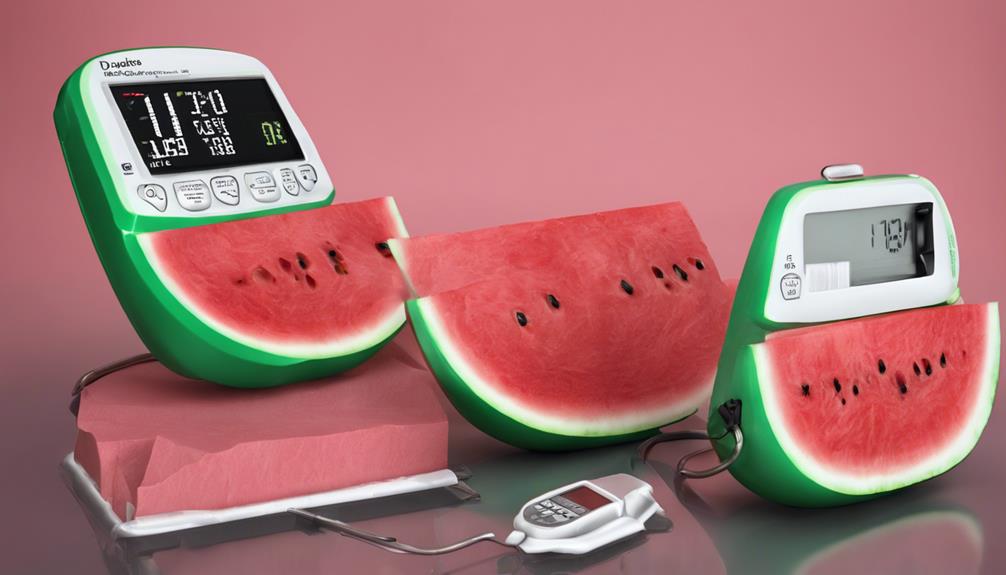When it comes to diabetes management, the phrase “you are what you eat” holds true, and the topic of watermelon often stirs up discussion.
While many enjoy its juicy sweetness, its impact on blood sugar levels raises concerns for individuals with diabetes.
The high sugar and carbohydrate content in watermelon could potentially lead to spikes in blood glucose levels, prompting a closer look at whether this beloved fruit is truly a friend or foe in diabetes management.
Key Takeaways
- Watermelon's high sugar content can spike blood sugar levels.
- Moderation and portion control are crucial for diabetes management.
- Pair watermelon with protein and healthy fats for balanced blood sugar.
- Opt for fruits with lower glycemic index scores like berries.
Watermelon's High Sugar Content
When considering watermelon's impact on blood sugar levels, individuals with diabetes should be vigilant about the fruit's high sugar content.
A medium slice of watermelon contains around 17.7g of sugar, which can lead to spikes in blood sugar levels if consumed in excess.
It's crucial for those with diabetes to monitor their intake of watermelon and practice moderation. Despite its sweetness, watermelon can still be enjoyed in small portions by individuals with diabetes, as long as they're mindful of their overall sugar intake.
The glycemic impact of watermelon's sugar content underscores the importance of consuming it in controlled amounts.
By understanding the sugar content in watermelon, individuals with diabetes can make informed choices about including this fruit in their diet.
Therefore, individuals with diabetes should be cautious about the high sugar content in watermelon and manage their consumption accordingly to maintain stable blood sugar levels.
Impact on Blood Sugar Levels

Watermelon's impact on blood sugar levels is influenced by its sugar and carbohydrate content per serving. Despite containing 9.42g of sugar and 11.5g of carbs in a 1 cup serving, watermelon has a moderate glycemic index of 72 and a low glycemic load of 5 per 120g serving. This makes it a diabetes-friendly option when consumed in moderation. Portion sizes play a crucial role in managing the impact of watermelon on blood sugar levels. Here is a breakdown to help you understand better:
| Nutrient | Amount per 1 cup (152g) | Amount per wedge (286g) |
|---|---|---|
| Sugar | 9.42g | 17.7g |
| Carbohydrates | 11.5g | 21.6g |
| Glycemic Index | 72 | – |
Alternatives for Diabetics
In selecting suitable fruit choices for individuals with diabetes, prioritize options with lower glycemic index scores, such as berries, apples, and citrus fruits. These fruits have a lower impact on blood sugar levels compared to high-sugar fruits like watermelon.
Additionally, incorporating fruits high in fiber, antioxidants, and nutrients like oranges, kiwis, and plums can be beneficial for managing diabetes. Opt for whole fruits instead of fruit juices or dried fruits to ensure you get the full benefit of the fruit's fiber content.
When consuming fruits, pairing them with protein and healthy fats can help balance blood sugar levels. It's crucial to monitor portion sizes and be mindful of overall carbohydrate intake, as even healthy fruits contain natural sugars that can affect blood glucose levels.
Glycemic Index Concerns

To address concerns regarding glycemic index and its impact on blood sugar levels, prioritizing fruits with lower glycemic scores is essential for individuals managing diabetes. While watermelon has a high glycemic index of 72, indicating its potential to affect blood sugar levels, it also has a low glycemic load of 5 per 120g serving.
This means that despite its high glycemic index, the amount of carbohydrates in a typical serving size may not significantly impact blood sugar levels. It's crucial for individuals with diabetes to balance their watermelon intake with low glycemic index foods to help regulate blood sugar levels effectively.
Monitoring portion sizes and incorporating protein and healthy fats when consuming watermelon can further assist in managing blood sugar levels. By choosing a variety of low glycemic index foods and being mindful of portion sizes, individuals can enjoy watermelon as part of a balanced diet that supports diabetes management.
Moderation Is Key
Moderation plays a crucial role in incorporating watermelon into a diabetes-friendly diet due to its impact on blood sugar levels. Here are four key points to consider:
- Low Glycemic Load: Watermelon has a low glycemic load of 5 per 120g serving, making it a suitable choice for individuals managing diabetes.
- Monitoring Portion Sizes: A wedge of watermelon contains 17.7g of sugar and 21.6g of carbs, emphasizing the importance of portion control to maintain blood sugar levels.
- Regulate Blood Sugar Levels: Pairing watermelon with protein and healthy fats can help regulate blood sugar levels, aiding in better glucose management for those with diabetes.
- Essential Nutrients: Despite its high glycemic index of 72, watermelon offers essential nutrients like vitamins A and C, potassium, and magnesium, which are beneficial for overall health.
Frequently Asked Questions
Can Watermelon Raise Your Blood Sugar?
Yes, watermelon can raise blood sugar levels due to its high glycemic index. However, when consumed in moderation, the impact on blood sugar is minimized. Pairing watermelon with proteins, fiber, and healthy fats can help regulate blood sugar better.
It's crucial to monitor portion sizes and balance watermelon intake with other low glycemic index foods for optimal blood sugar control.
What Fruits Should Diabetics Avoid?
We should steer clear of fruits high in sugar to help manage blood sugar levels effectively. Limit intake of fruits with high glycemic index values to avoid rapid spikes in blood sugar.
Tropical fruits like mangoes, pineapples, and bananas have higher sugar content, impacting blood glucose control. Dried fruits like raisins and dates are concentrated in sugar and can cause significant blood sugar spikes.
Avoid fruit juices, even freshly squeezed, due to their concentrated sugar content and potential to raise blood sugar levels rapidly.
What Is the Best Fruit for Diabetics to Eat?
When it comes to the best fruit for diabetics, berries, apples, and citrus fruits take the crown. These options have a lower impact on blood sugar levels compared to high sugar fruits like watermelon.
Berries are fiber and antioxidant powerhouses, while citrus fruits bring vitamin C with less sugar. Opting for fruits with lower sugar and higher fiber content is our go-to for managing diabetes effectively.
Which Melon Is Best for Diabetics?
We find that cantaloupe is the superior melon for diabetics due to its lower sugar content and glycemic index compared to watermelon. With about 12g of sugar and 14g of carbohydrates per cup, cantaloupe is a better option for managing blood sugar levels.
Its richness in vitamins A and C, fiber, and antioxidants offers various health benefits. Including cantaloupe in a balanced diabetes diet can help curb sweet cravings while stabilizing blood sugar.
Conclusion
In conclusion, watermelon may not be the best choice for individuals with diabetes due to its high sugar content. While it offers nutrients, its impact on blood sugar levels should be considered. Moderation is key when consuming watermelon, and it's important to balance it with other low glycemic index foods.
Remember, when managing diabetes, it's best to choose foods that won't cause spikes in blood sugar levels.









